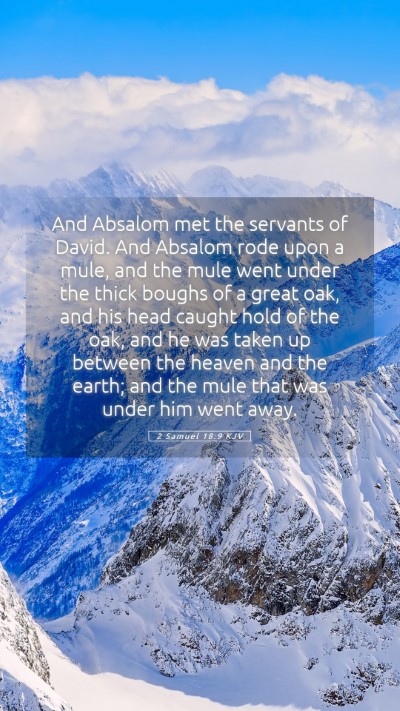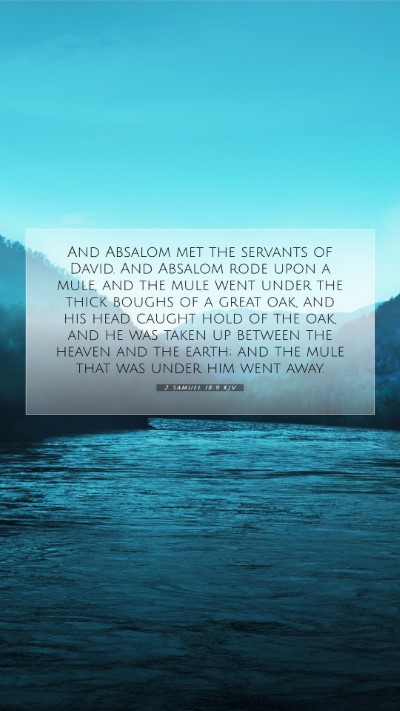Bible Verse Commentary on 2 Samuel 18:9
Verse: 2 Samuel 18:9 - "And Absalom met the servants of David. And Absalom rode upon a mule, and the mule went under the thick boughs of a great oak, and his head caught hold of the oak, and he was taken up between the heaven and the earth; and the mule that was under him went away."
Meaning of the Verse
This verse describes a critical moment in the narrative of Absalom, the son of King David, as he faces the consequences of his rebellion. Here, Absalom finds himself in a precarious situation that ultimately leads to his demise.
Insights from Commentaries
-
Matthew Henry: Matthew Henry emphasizes the unexpected and tragic nature of Absalom's downfall. He notes that despite Absalom's royal status and his attempt to overtake his father, he is ultimately caught in a vulnerable position. This situation serves as a reminder of the consequences of pride and rebellion against God's anointed authority.
-
Albert Barnes: Albert Barnes offers an interpretation focusing on Absalom's arrogance and the literal symbolism of his long hair, which caused him trouble. He points out that Absalom's vanity and reliance on his physical appearance led him to a fatal error. Barnes also highlights the idea of divine justice at play, where one's own shortcomings become the instrument of their downfall.
-
Adam Clarke: Adam Clarke provides a detailed exegesis of the incident. He notes that Absalom's choice of transportation—a mule—was significant in that it suggests both nobility and a misplaced confidence. Clarke discusses the physical description of the scene, emphasizing how the thick boughs of the oak tree became an instrument of divine intervention in Absalom's fate.
Bible Verse Interpretations
The interpretations of this verse remind readers of several key truths:
- Consequences of Rebellion: Absalom's rebellion against his father, King David, is presented as a cautionary tale about the risks of defiance against authority.
- Divine Justice: The fatal outcome of Absalom's situation illustrates an important Biblical principle: divine justice often manifests through unforeseen circumstances that reflect one's choices.
- Vulnerability of Pride: Absalom's situation also demonstrates that pride goes before destruction, as his hair—often a symbol of his power—ultimately becomes his undoing.
Understanding Scripture Through Context
To grasp the full meaning of this verse, it's important to consider the historical context surrounding David's reign and Absalom's rebellion. This verse occurs during a time of civil strife within Israel, where familial loyalty and political authority are tested.
Historical Context
Absalom’s actions are rooted in deep familial conflict. His desire for power led him not only to rebel against his father but also to seek the loyalty of the nation, leading to a civil war that tore at the very fabric of Israel. Such a backdrop paints Absalom not just as a desperate son but as a tragic figure whose ambition leads to his downfall.
Application of the Verse
The contemporary reader can extract profound lessons from 2 Samuel 18:9:
- Personal Reflection: This verse invites personal reflection on one’s ambitions and the methods through which we pursue them. Are we causing harm to relationships in the pursuit of our goals?
- Leadership Lessons: Leaders should consider the weight of their decisions and the potential repercussions of prideful actions. It serves as a reminder to lead with humility rather than arrogance.
- Trusting Divine Order: As the narrative shows, divine order prevails even amid chaos. Believers are encouraged to trust in God’s sovereignty, recognizing that He works through even the most dire situations.
Cross References
- 2 Samuel 15:1-6 - The background of Absalom's rebellion.
- Proverbs 16:18 - "Pride goes before destruction..." emphasizing the theme of pride leading to downfall.
- Galatians 6:7 - "For whatever a man sows, this he will also reap." A parallel to the consequences of one’s actions.
Conclusion
Understanding 2 Samuel 18:9 involves a blend of historical narrative, theological reflection, and personal application. By engaging deeply with scripture analysis and biblical exegesis, believers can glean insights that speak to the human condition and the importance of aligning our lives with divine principles.
Engage with this verse in a Bible study group or online Bible study to deepen your understanding of its implications and applications in daily life.


